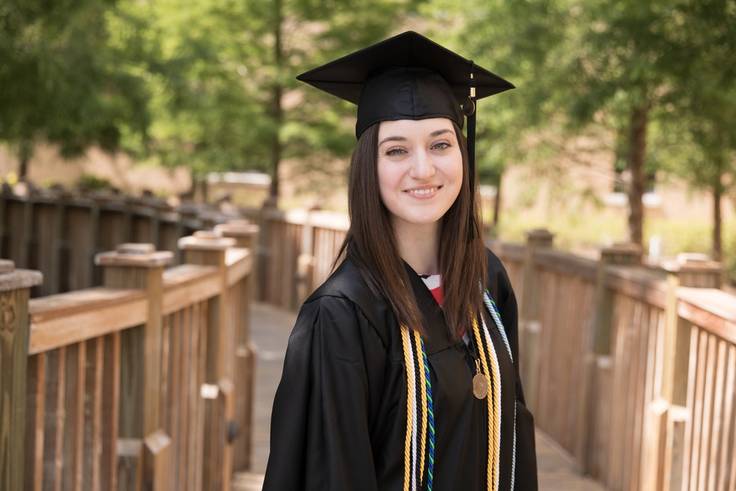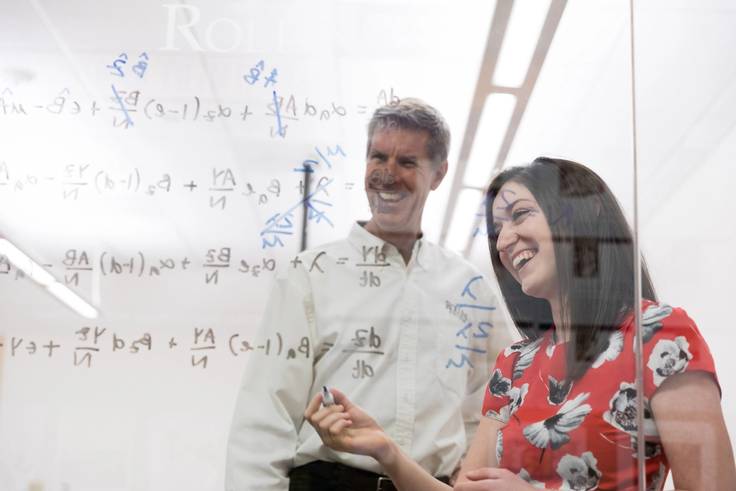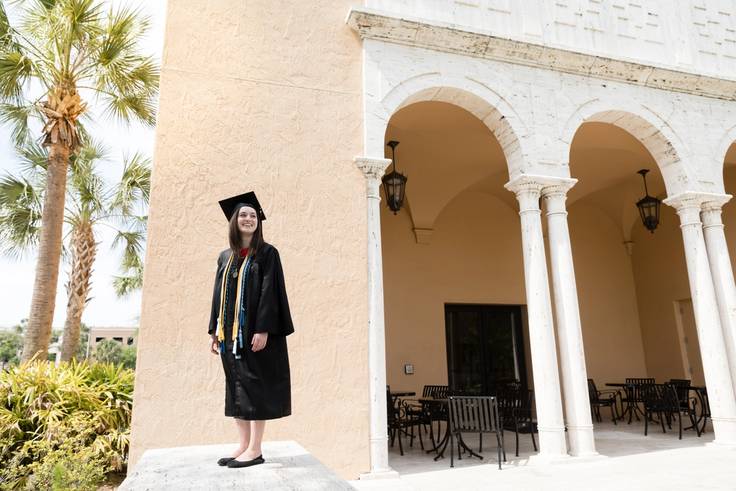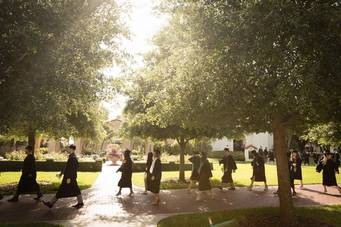Calculating Impact
August 08, 2018
By Katie Pearce ’19

Arden Baxter ’18 always loved math, but it wasn’t until coming to Rollins that she really understood the power in numbers.
At the same time Arden Baxter ’18 started solving coding puzzles in her Rollins computer science classes, she attended her first Immersion focused on migrant farmworkers. It was this ostensible collision of worlds that launched Baxter on her newfound path. Not long after that first Immersion, Baxter started leading these community-engagement experiences herself and eventually became a board member of Rollins Relief, where she discovered how mathematics could actually serve to make a difference in people’s daily lives.
“Rollins showed me that I can combine my different passions,” says Baxter. “I can make a career for myself that is not only challenging and uses my major, but is also impactful in the community.”
Baxter calls out a focus on critical thinking and problem solving as a defining characteristic of a Rollins liberal arts education, along with an emphasis on pursuing seemingly disparate disciplines and experiences. While at Rollins, she majored in math and computer science, minored in Spanish, and devoted herself to community service and engagement, which led to an honors thesis that combined them all: modeling public opinion on immigration.
After graduating this past May, Baxter is poised to turn her passion for math and service into a meaningful career. She’ll begin a PhD program in operations research at Georgia Tech in the fall with the ultimate goal of helping aid organizations like the Red Cross and the CDC improve logistics after natural disasters.
We recently caught up with Baxter to talk about math, mentors, and more.

Tell us about your experience with Rollins Relief. What kind of impact were you able to make? What impact did it have on you? “I started with Rollins Relief the second semester of my freshman year and joined the executive board. As the events coordinator, I did all the advertisements and arranged for the JUMP bus, so we could go to The Mustard Seed, one of the largest furniture banks in Central Florida. I led monthly services there and each time I would recruit new students and professors. I would always lead a reflection during the ride back on how what we were doing was impactful to families in need. For me, it was my first time in a leadership position. It helped me grow as a leader and grew my interest in community engagement.”
You were also very involved with the Immersion program. Which Immersions did you participate in, and what did you take away from those experiences? “There was one Immersion where we went to the Hope CommUnity Center in Apopka to learn firsthand about the lives, rights, and work of migrant workers. We pulled weeds in the fields, and each of us stayed overnight. I stayed with a mom who didn’t speak any English, but through my broken Spanish, I understood how her kids came home every day scared she would be deported due to her undocumented status. That’s when I realized how life-changing Immersions can be. I ended up facilitating an Immersion to New Orleans through Rollins Relief. We worked with Habitat for Humanity to build a home for a family and learned about the impact that Hurricane Katrina still has on the area even 13 years later. I saw that I could do more than just participate in these Immersions—I could lead them.

Would you say that you had a mentor at Rollins? “Dr. Anderson was one of my mentors. I started at Rollins having no clue what I wanted to do, but I knew I always liked math. I was scheduled to take Calculus 1 my first year but had already taken 1 and 2 in high school. Dr. Anderson recommended that I take his Probability and Statistics class and has been an accessible resource to me for questions and problems ever since. Outside of academics, Dr. Jayashree Shivamoggi [director of Rollins’ Office of External and Competitive Scholarship] helped me with scholarships and a lot of applications. She is one of the main reasons I got into graduate school. She always challenges me to think bigger.”
Your honors thesis on modeling public opinion really encapsulates your two passions, math and service. Why is this project important to you? “I had done previous research with creating mathematical models and wanted to do something similar through my honors thesis geared toward my passion for community engagement. I had this idea of a mathematical model that would show how opinions are changing between different opinion groups. There are always two opposing sides to an issue, and the first issue I thought of was immigration. I wanted to know how people switch sides and how we get this polarization. I tried to create a mathematical model that represented change in opinion. I hope it will be beneficial for sociologists or politicians, anyone who wants to know how opinions change.”
Why study math and computer science at Rollins? “I think many people believe that the sciences at a liberal arts college are not as strong as a university with a college of science. These days it’s important to have critical-thinking and problem-solving skills. That’s what I got at Rollins. I learned skills that will help me in my career and help me learn about a new topic more easily. That’s something unique about Rollins—they focus on learning how to learn.”
Why did you minor in Spanish? “I did Spanish because I’m a firm believer in making connections and being a global citizen. It’s our job to be able to communicate with others. I’m from Texas. It made sense for me to communicate with this entire population that speaks Spanish—not to restrict myself to speaking only English. I just kept taking Spanish to improve and then ended up getting a minor.”

Did you study abroad during your time at Rollins? “I studied abroad for my entire junior year. I went to Spain in the fall and took all Spanish classes. I wanted to get immersed in it and really learn the language. I stayed with a host family who didn’t know any English, and it forced me to speak, learn, and listen. In the spring, I went to Hong Kong where I took math courses. It was worth it to experience a completely different culture. It was something that I wouldn’t have been able to do had I not been at Rollins.”
What advice do you have for incoming first-year students? “If you’re interested in something, do it. At Rollins you have a unique opportunity due to the small class sizes. I wanted to get the most out of my experience, so I just did a bunch of stuff until I found what I really liked. Make sure that you’re talking with your professors and faculty—make those connections. I know that the professors and faculty I’m close with will always be a resource for me.”
Why was Rollins worth it? “Rollins is worth it because I genuinely think my experience was one of a kind. I studied abroad for an entire year, and all of my scholarships were carried over as part of the tuition-exchange program. The class sizes are small. More than that, the professors and faculty really care and want to make lifelong relationships. Rollins strives to have people engaged and doing service. We’re not in this alone and it’s important to realize that. With all the issues going on, we need to be mindful about the careers we’re pursuing and the actions we are taking to better society.”

Rollins Results
From our innovative curriculum to our commitment to career services, find out how Rollins prepares our graduates to lead meaningful lives and forge productive careers.
Read More
July 08, 2024
Gunter’s Book on Climate Change Receives Multiple Awards
Political science professor Mike Gunter’s book Climate Travels recently won awards from Foreword magazine and the American Library Association.
June 27, 2024
Lahlou ’24 Earns Boren Scholarship
Adam Lahlou ’24 has earned a Boren Scholarship, a prestigious award reserved for students who intend to pursue careers in federal national security.
June 17, 2024
A Path to Purpose
Falecia Williams ’91 expanded her world by earning a Rollins degree. Now, she is working to expand the worlds of thousands of college students.
